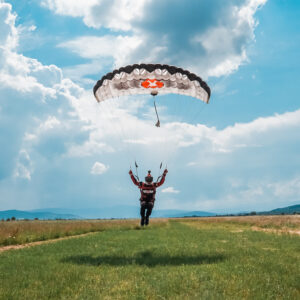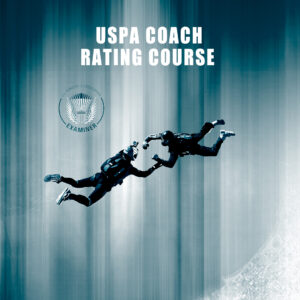Description
With big responsibilities come big thrills and big feelings of accomplishment. Working with AFF students is a tremendous amount of fun!
The Course
The USPA AFF Instructor Rating Course is 6-7 day course. As a participant, you must attend the entire program in order to gain the maximum benefit.
Course Duration: 6-7 days (depending on the number of candidates and weather conditions)
Minimum 2 candidates per course, maximum group of 5 candidates.
Reservation: In order to reserve a spot, you need to pay a deposit of 400 €. This deposit is valid for one year and is non-refundable.
Please note that the remaining balance is to be paid in full before the course, in cash or by credit card.
Course price does not include jump tickets for the candidate and instructor.
Pre-course training is included in the price and it costs 250 EUR per candidate (minimum 2 candidates).
Requirements
To participate in a USPA AFF rating course you need the following:
- Current USPA membership
- USPA C-license
- USPA Coach rating or another USPA Instructor Rating (IAD/SL, Tandem)
- If you hold the Coach rating for less than 12 months you need to have at least 500 jumps
- Documentation of 6 hours of accumulated free-fall time
- Have the AFF pre-course activity signed off on your USPA online profile or Proficiency card
- Study content of IRM
- Fill in pre-requisites on the USPA Proficiency Card
- Fill in the answer sheet of the Open Book Exam prior to the course (“General Instructor” and “AFF-I” )
Equipment
For your and our safety, we ask you to remove all sharp objects (brackets, camera housings, etc) from your helmet for the practice and evaluation jumps. Full face helmets are allowed during the course.
Bring a jumpsuit that you are comfortable with. Bootie suits are a great help because in AFF aggressive flying is sometimes necessary. For a larger range in fall rate, weight belts and baggy shirts over a normal jumpsuit are very helpful. If you prefer your free-fly suit that is fine too.
Proficiency Card
The “AFF IRC Proficiency Card” can be found in the IRM and serves as your rating application to be sent to the USPA after the course. Most tasks will be signed off during the course by I/E or an evaluator. Tasks No 1 – 8 should be done prior to the course and need to be signed by a current USPA Instructor. The signatures on the proficiency card are valid for up to 12 months.
Pre-course training
AFF Instructor Rating Course course starts in the classroom with verification of all requirements. All candidates should have the needed documentation at hand. Pre-course training is included in the price and it costs 250 EUR per candidate (minimum 2 candidates).
During the AFF pre-course, you will receive training in the specific AFF in-air skills. The practice jumps start simple and become more complex and challenging as you progress until you are ready for the actual evaluation jumps.
Things we work on are:
Flying hard exits
Slot flying with a moving student
Reading the student’s body position
Properly presenting hand signals,
Blocking and re-docking
Smart flying long distances
Stopping spins
Rolling over an inverted student
Assisting with deployment including pulling for the student
Each candidate will be evaluated on ground preparations (Category C and Category D from the ISP).
The Pre-course will prepare you 100% for the evaluation jumps.
COURSE EVALUATIONS
Written Evaluations
- Pass the USPA General and AFFI exam with a pass mark of 80%.
Pass three (3) evaluation jumps:
You will have a total of four jumps and must pass three. The jumps have a number of criteria: You must score a minimum of 75% to pass (plus pass all mandatory criteria).
The following is a description of evaluation jumps:
Category “C” main and reserve side (two jumps)
The Category “C” evaluations are done from a minimum of 9,000 feet, and you must demonstrate the proper responses to both the main and reserve side exits. The jump will be comprised of a blend of any of the trained techniques and skills. The “student” wave and pull altitude is 6,000 feet with a hard deck of 4,000 feet. You must complete at least one of the Category “C”’s as a two-on-one with a partner on exit.
Category “D”
The Category “D” evaluations are one-on-one jumps done from a minimum of 9,000 feet. The jump will be comprised of a blend of any of the trained techniques and skills. The “student” wave and pull altitude is 5,500 feet with a hard deck of 4,000 feet.
Supervision Test:
The supervision jump will be included in one or more of the above-mentioned freefall evaluations. The supervision test is done with the “student” being played by a course evaluator. The instructor candidate will have to demonstrate:
- Proper preparation for the jump
- Supervision in the boarding and in-aircraft ride to altitude
- Apply positive psychology and focus strategies during the ride up to an altitude
- Fulfill your role during freefall, as described above
- Monitor your novice’s canopy control for landing
- Perform a positive debrief: The debrief will be done on recall. A video can be taken on the jump (recommended) for debriefing reference and more importantly, the evaluator’s debrief of the candidate.
Presentations:
Conduct presentations for Category “C” and Category “D” jump four.
Candidates will teach Category “C and Category “D” jump four from the SDU handout manual. The presentation will take approximately 45 minutes. The key issues are:
- Test all required review content for the category.
- Conduct the motor skill drills by the required repetition and holding times.
- Immediately correct any student body position errors that may occur.
- Teach all theoretical content correctly.
There are a number of other criteria scored in the presentation that are averaged in the total end score.
USPA IRM Requirements:
- Sit through and assist on two complete First Jump Courses.
Terms & Conditions:
The final decision on your suitability to skydive rests entirely with instructors and you must comply with the skydiving center’s rules at all times.
Giving incorrect personal information when booking may result in you forfeiting all the costs for the course.
Students must accept that all the equipment used to practice skydiving is in perfect conditions of use and properly maintained. Furthermore, they are responsible for the condition of personal equipment and that the personal equipment even being suitably maintained and revised periodically can suffer malfunctions being exposed to extreme conditions.
Students are bound to declare the necessary documents before making skydiving activity, showing sufficient insurance to cover any medical costs and the mandatory Third Party Liability cover. EU members are reminded that European Health Insurance Card may not cover all medical costs and does not cover any long-term medical or repatriation costs.
If you fail to turn up on the day without giving at least 5 days’ notice you will lose your deposit.
Any courses taken with promotional prices must be fully completed to keep the discounted price. If the course is not completed, all jumps will be charged at the normal (higher) costs.
If bad weather prevents you from jumping, a new date can be arranged for mutual convenience. No refunds are offered for not jumping due to bad weather.
If you arrive without the necessary paperwork, you may forfeit your course along with all costs incurred.
Are you ready to become an AFF Instructor ? Click on the button and book your spot!






Reviews
There are no reviews yet.